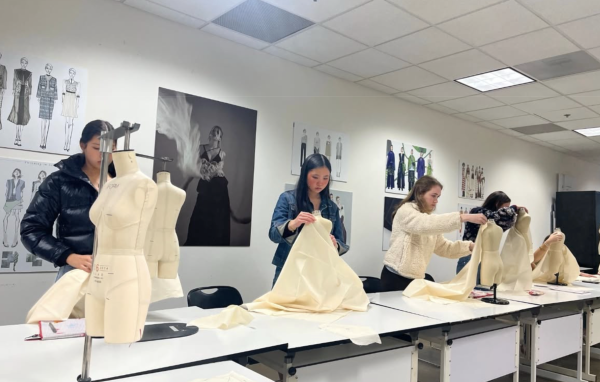Golden Globes 2019: A Win for Representation
On Jan. 6, the 76th Golden Globe Awards highlighted dozens of outstanding films and distinguished actors, many of who used the opportunity in the company of their peers to spark important conversations concerning diversity and sexual assault in the entertainment industry.
The event was hosted by Adam Samberg and Sandra Oh, two incredibly successful actors who entertained the crowd of celebrities and maintained a humorous, yet earnest atmosphere. Sandra Oh made history multiple times that evening—she was not only the first Asian-American to host the Golden Globes, but also the first Asian-American to take home awards in multiple categories overall. After winning her first Golden Globe a decade ago for Best Supporting Actress, this year, Oh won her second for Best Actress as the star of the BBC Television show, Killing Eve.
“Sandra Oh’s success is really an inspiration to many people, like my students and my kids,” said Amy Patel, an upper school English teacher. “It’s such a risk to go into Hollywood, and when someone like Oh succeeds and does so well, it can influence and motivate others in the Asian community and prove that acting isn’t as risky and taboo as it’s perceived to be.” While Oh had numerous accomplishments to celebrate for herself, the host made sure to uplift other successes in diversity as well, such as pointing out the monumental success of Jon M. Chu’s Crazy Rich Asians. The film boasted an all Asian-American cast in an effort to address decades of white supremacy in Hollywood that often pushed people of color to the sidelines with stereotypical roles in TV and film. After worldwide praise and box office earnings of $200 million in just under two months since its release, Crazy Rich Asians was nominated for Best Motion Picture—Musical or Comedy. Additionally, the film’s lead actress Constance Wu was nominated for Best Performance by an Actress.
“Crazy Rich Asians and Constance Wu’s success start to set up a platform for more Asian women to be represented in the Golden Globes and other prestigious awards,” said Payton Selby, co-leader of GEAR, the Gender Equality and Relations club on campus. “Not only does it inspire and empower Asian communities everywhere, I think it also sends a message to the world that there are really successful Asian women who are super capable of the [roles] that we haven’t been casting them in.”
Representation in television is becoming more and more essential, especially now as the entertainment industry only continues to expand.
“Diversity is profoundly important, especially now, since television has become such an integral part of everyday life,” said Patel. “People talk about it at dinner parties, at work, everywhere. “Seeing diversity on screen should be the new normal.” Despite this progress, the fight for representation is still ongoing, specifically through battling against the whitewashing and miscasting in Hollywood that is still present today.
“Over the years, strides have definitely been made regarding the integration of people from all races, ethnic backgrounds, and genders, but there’s still a long way to go,” said sophomore Aydin Bandukwala. “Stories about black families and Asian culture are becoming more mainstream, but we rarely see stories about Muslim families or LGBTQ people. There’s a lot of more work to be done so that our media can represent the diversity that has become our world.” The Golden Globes was not only monumental concerning advances in Asian-American representation, but also for the Time’s Up movement. Numerous celebrities flaunted their Time’s Up ribbons and pins in solidarity, while many actresses also donned black gowns on the red carpet to raise awareness.
“Time’s Up is centralized mostly around women in media and entertainment, focusing on how they often get sexually harassed or asked to perform sexual favors in exchange for a promotion,” said Selby. “It became this movement that’s been monopolized by women in media who are stepping forwards and telling their stories in an effort to stop harassment in professional workplaces.” The movement began in 2017 after many sexual assault allegations against Harvey Weinstein, a powerful and successful businessman in the film industry. Multiple high profile actresses, such as Cara Delevingne and Angelina Jolie, stepped forward and voiced their personal stories of Weinstein’s misconduct, thus igniting the Time’s Up movement and empowering victims to speak up and tell their own stories.
“With award shows such as the Golden Globes, many actors and actresses often take the time in their acceptance speeches to make a statement or illuminate certain problems and issues,” said Selby. “They’re using their fame and their platform to empower other people and highlight a bigger problem either in the industry or in the world.” Although celebrities have a wide platform to voice their opinions it’s also up to the general public as individuals to confront and criticize Hollywood’s flaws.
“Change starts small,” said Selby. “Every single person has their own, individual platform, especially now with the internet and social media. Every single person can take on the responsibility of calling out Hollywood’s mistakes and demanding representation.”
All in all, the 2019 Golden Globes represented a year of significant change and progress for diversity and victims of assault in Hollywood, but the battle for justice and inclusivity has only just begun.



